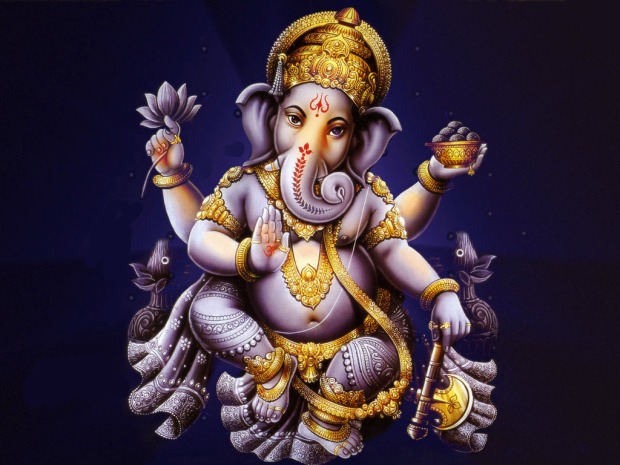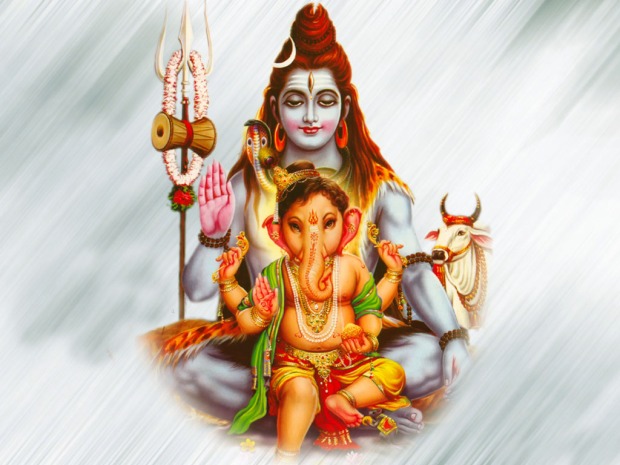
Lord Ganesha (Elephant Head God)
 (For website url: http://www.doyoureckon.wordpress.com)
(For website url: http://www.doyoureckon.wordpress.com)
Asian culture is full of religious and spiritual stuff wherein you can find varied god and their respective sotries. Lord Ganesha, son of Lord Shiva and Devi Parvati.
Similar to other god even Ganesha has many names, very famous amongst them are: Ganpati, Vinayak, Pillaiyar, Vighneshwara, Dvaimatura (one who has two mothers), Lambodara (one who has a pot belly, or, literally, one who has a hanging belly), Gajanana (having the face of an elephant), etc. List of 108 names of Ganesha is shown at the end of this article.
Ganesha is widely worshiped for many purposes like removing of obstacles, knowledge, wealth, power, etc. as he is the elder son of the creator, the destroyer Lord Shiva. He is worshiped in many different parts of the world like India, Nepal, United States, Canada, Mauritius, Singapore, Thailand, Cambodia, Burma and Fiji.

Apart from Indians and specially Hindus, the story behind the elephant head is rarely known to others. Let us go through a quick short part of it. Mother of Lord Ganesha, Devi Parvati set him to stand guard at her door while she bathed. Lord Shiva returned and, as Ganesha didn’t know him, he didn’t allow him to enter. Lord Shiva became enraged, severed the head of the child and entered his house. Parvati got angry on Lord Shiva and asked him give her son back alive. Lord Shiva promised her and said that he will fix the head of any one who will come first on the way, suddenly an elephant came on the way and Lord Shiva fixed the head of an elephant in place of Ganesha’s head. In this way, Lord Ganesha came to be depicted as the elephant-headed God.
During Ganesh Chaturthi festival people buy Lord Ganesha idols to make them sit in their particular premises or nearby house/office with an open invitation to all. Prayers and offerings are given to all during the rituals everyday untill the date of Ganesh Visarjan (Ganesh Visarjan – People carry Ganesh idol to the water resources i.e. river, sea, etc. and put it in the water). Ganesh Visarjan ceremony is very glamours, full of traditional music, dance, joy & happiness all around. During Ganesh Visarjan you can also find feeling of losing someone you love the most, people request to the god to come back soon.
In the field of spiritual practices, it is said that Ganesh resides in the first chakra called Muladhar Chakra (Basic Chakra). Muladhar chakra is the chakra for manifestation or outward expansion and in other teachings it is also believed that muladhar chakra is for prosperity and will to live.
One can chant the following mantra as prayer:
- Vakra-Tunndda Maha-Kaaya Surya-Kotti Samaprabha Nirvighnam Kuru Me Deva Sarva-Kaaryessu Sarvadaa.
- Om Gum Ganpataye Namah Om
- Om Shree Ganashai Namah Om
Chanting can also be done on any one of the names of Lord Ganesh, here is the list of 108 names:
Akhurath – One who has Mouse as His Charioteer
Alampata – Ever Eternal Lord
Amit – Incomparable Lord
Anantachidrupamayam – Infinite and Consciousness Personified
Avaneesh – Lord of the whole World
Avighna – Remover of Obstacles
Balaganapati – Beloved and Lovable Child
Bhalchandra – Moon-Crested Lord
Bheema – Huge and Gigantic
Bhupati – Lord of the Gods
Bhuvanpati – God of the Gods
Buddhinath – God of Wisdom
Buddhipriya – Knowledge
Buddhividhata – God of Knowledge
Chaturbhuj – One who has Four Arms
Devadeva – Lord of All Lords
Devantakanashakarin – Destroyer of Evils and Asuras
Devavrata – One who accepts all Penances
Devendrashika – Protector of All Gods
Dharmik – One who gives Charity
Dhoomravarna – Smoke-Hued Lord
Durja – Invincible Lord
Dvaimatura – One who has two Mothers
Ekaakshara – He of the Single Syllable
Ekadanta – Single-Tusked Lord
Ekadrishta – Single-Tusked Lord
Eshanputra – Lord Shiva’s Son
Gadadhara – One who has The Mace as His Weapon
Gajakarna – One who has Eyes like an Elephant
Gajanana – Elephant-Faced Lord
Gajananeti – Elephant-Faced Lord
Gajavakra – Trunk of The Elephant
Gajavaktra – One who has Mouth like an Elephant
Ganadhakshya – Lord of All Ganas (Gods)
Ganadhyakshina – Leader of All The Celestial Bodies
Ganapati – Lord of All Ganas (Gods)
Gaurisuta – The Son of Gauri (Parvati)
Gunina – One who is The Master of All Virtues
Haridra – One who is Golden Coloured
Heramba – Mother’s Beloved Son
Kapila – Yellowish-Brown Coloured
Kaveesha – Master of Poets
Krti – Lord of Music
Kripalu – Merciful Lord
Krishapingaksha – Yellowish-Brown Eyed
Kshamakaram – The Place of Forgiveness
Kshipra – One who is easy to Appease
Lambakarna – Large-Eared Lord
Lambodara – The Huge Bellied Lord
Mahabala – Enormously Strong Lord
Mahaganapati – Omnipotent and Supreme Lord
Maheshwaram – Lord of The Universe
Mangalamurti – All Auspicious Lord
Manomay – Winner of Hearts
Mrityuanjaya – Conqueror of Death
Mundakarama – Abode of Happiness
Muktidaya – Bestower of Eternal Bliss
Musikvahana – One who has mouse as charioteer
Nadapratithishta – One who Appreciates and Loves Music
Namasthetu – Vanquisher of All Evils & Vices & Sins
Nandana – Lord Shiva’s Son
Nideeshwaram – Giver of Wealth and Treasures
Omkara – One who has the Form Of OM
Pitambara – One who has Yellow-Colored Body
Pramoda – Lord of All Abodes
Prathameshwara – First Among All
Purush – The Omnipotent Personality
Rakta – One who has Red-Colored Body
Rudrapriya – Beloved Of Lord Shiva
Sarvadevatman – Acceptor of All Celestial Offerings
Sarvasiddhanta – Bestower of Skills and Wisdom
Sarvatman – Protector of The Universe
Shambhavi – The Son of Parvati
Shashivarnam – One who has a Moon like Complexion
Shoorpakarna – Large-Eared Lord
Shuban – All Auspicious Lord
Shubhagunakanan – One who is The Master of All Virtues
Shweta – One who is as Pure as the White Color
Siddhidhata – Bestower of Success & Accomplishments
Siddhipriya – Bestower of Wishes and Boons
Siddhivinayaka – Bestower of Success
Skandapurvaja – Elder Brother of Skand (Lord Kartik)
Sumukha – Auspicious Face
Sureshwaram – Lord of All Lords
Swaroop – Lover of Beauty
Tarun – Ageless
Uddanda – Nemesis of Evils and Vices
Umaputra – The Son of Goddess Uma (Parvati)
Vakratunda – Curved Trunk Lord
Varaganapati – Bestower of Boons
Varaprada – Granter of Wishes and Boons
Varadavinayaka – Bestower of Success
Veeraganapati – Heroic Lord
Vidyavaridhi – God of Wisdom
Vighnahara – Remover of Obstacles
Vignaharta – Demolisher of Obstacles
Vighnaraja – Lord of All Hindrances
Vighnarajendra – Lord of All Obstacles
Vighnavinashanaya – Destroyer of All Obstacles & Impediments
Vigneshwara – Lord of All Obstacles
Vikat – Huge and Gigantic
Vinayaka – Lord of All
Vishwamukha – Master of The Universe
Vishwaraja – King of The World
Yagnakaya – Acceptor of All Sacred & Sacrficial Offerings
Yashaskaram – Bestower of Fame and Fortune
Yashvasin – Beloved and Ever Popular Lord
Yogadhipa – The Lord of Meditation







